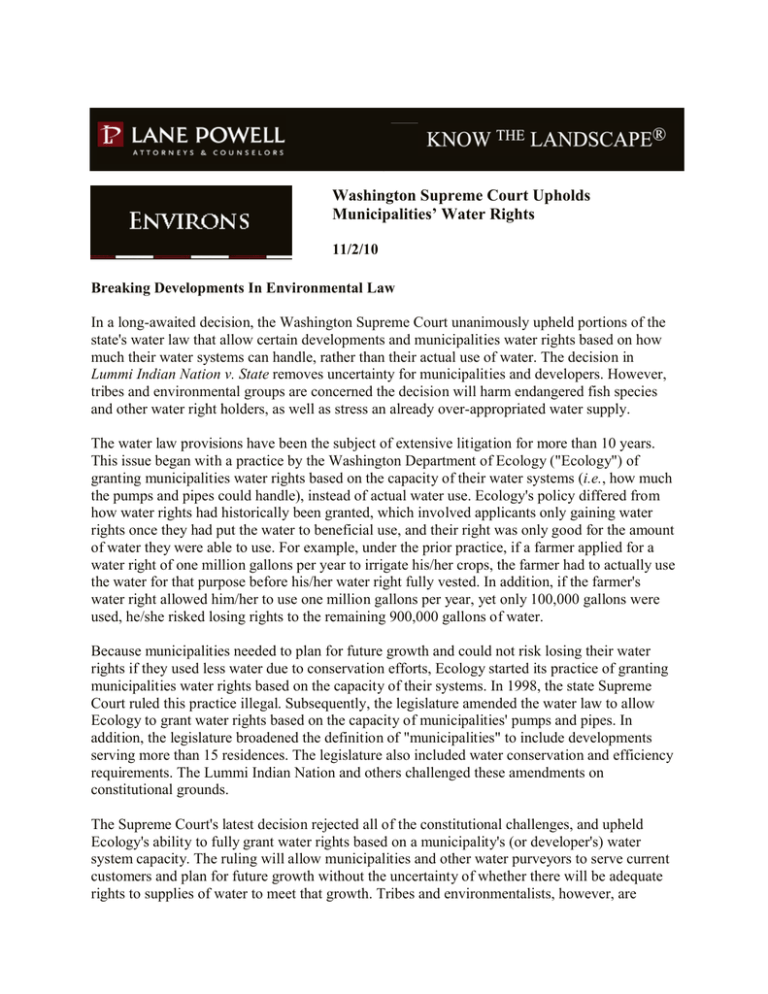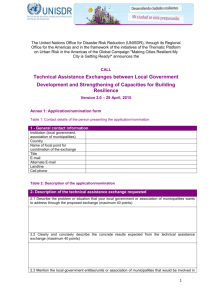Washington Supreme Court Upholds Municipalities’ Water Rights
advertisement

Washington Supreme Court Upholds Municipalities’ Water Rights 11/2/10 Breaking Developments In Environmental Law In a long-awaited decision, the Washington Supreme Court unanimously upheld portions of the state's water law that allow certain developments and municipalities water rights based on how much their water systems can handle, rather than their actual use of water. The decision in Lummi Indian Nation v. State removes uncertainty for municipalities and developers. However, tribes and environmental groups are concerned the decision will harm endangered fish species and other water right holders, as well as stress an already over-appropriated water supply. The water law provisions have been the subject of extensive litigation for more than 10 years. This issue began with a practice by the Washington Department of Ecology ("Ecology") of granting municipalities water rights based on the capacity of their water systems (i.e., how much the pumps and pipes could handle), instead of actual water use. Ecology's policy differed from how water rights had historically been granted, which involved applicants only gaining water rights once they had put the water to beneficial use, and their right was only good for the amount of water they were able to use. For example, under the prior practice, if a farmer applied for a water right of one million gallons per year to irrigate his/her crops, the farmer had to actually use the water for that purpose before his/her water right fully vested. In addition, if the farmer's water right allowed him/her to use one million gallons per year, yet only 100,000 gallons were used, he/she risked losing rights to the remaining 900,000 gallons of water. Because municipalities needed to plan for future growth and could not risk losing their water rights if they used less water due to conservation efforts, Ecology started its practice of granting municipalities water rights based on the capacity of their systems. In 1998, the state Supreme Court ruled this practice illegal. Subsequently, the legislature amended the water law to allow Ecology to grant water rights based on the capacity of municipalities' pumps and pipes. In addition, the legislature broadened the definition of "municipalities" to include developments serving more than 15 residences. The legislature also included water conservation and efficiency requirements. The Lummi Indian Nation and others challenged these amendments on constitutional grounds. The Supreme Court's latest decision rejected all of the constitutional challenges, and upheld Ecology's ability to fully grant water rights based on a municipality's (or developer's) water system capacity. The ruling will allow municipalities and other water purveyors to serve current customers and plan for future growth without the uncertainty of whether there will be adequate rights to supplies of water to meet that growth. Tribes and environmentalists, however, are concerned that the decision will reduce the available water needed for fish and other wildlife, reduce the water available to other water right holders, such as farmers, and encourage additional development. 206.223.7000 Seattle 503.778.2100 Portland environs@lanepowell.com www.lanepowell.com We provide Environs as a service to our clients, colleagues and friends. It is intended to be a source of general information, not an opinion or legal advice on any specific situation, and does not create an attorney-client relationship with our readers. If you would like more information regarding whether we may assist you in any particular matter, please contact one of our lawyers, using care not to provide us any confidential information until we have notified you in writing that there are no conflicts of interest and that we have agreed to represent you on the specific matter that is the subject of your inquiry. Copyright © 2010 Lane Powell PC Seattle - Portland - Anchorage - Olympia - Tacoma - London 2




